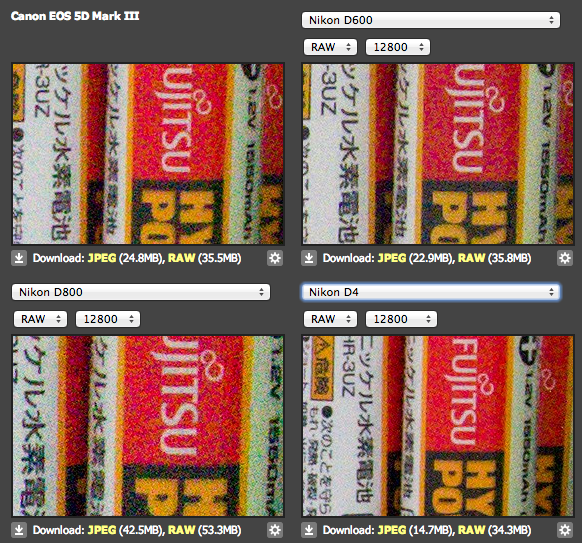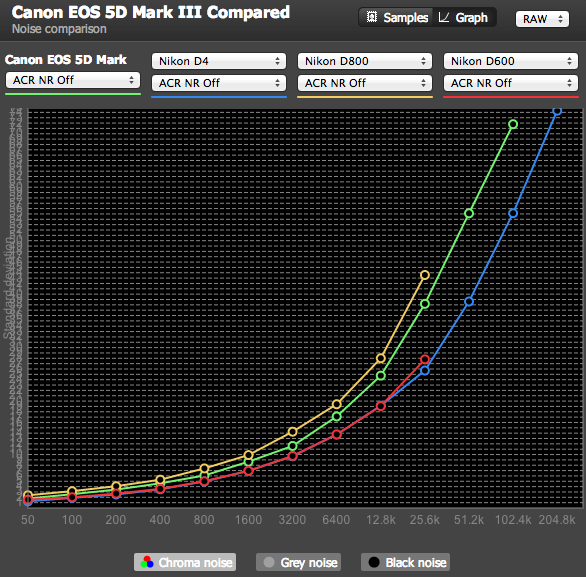I get an extremely wide dynamic range.
That sounds more like poor lighting and makeup to me
Sometimes it absolutely is. I'm shooting for community theatre, not professional theatre (though, around here, there's sometimes seems to be very little difference). Sometimes, however, it's not. For example, your hero may be sitting in a bright pool of light, while secondary characters are skulking around in the dim background. You want those characters in your shot, because it would change the tenor of the scene if they weren't there, yet if you expose for the hero (1/125s, f2.8, ISO 1600), they're virtually black, and if you expose to get reasonable detail of the characters in the shadows (1/60s, f2.8, ISO 1600), your hero ends blown out. If I had a bit more dynamic range, that's not as significant of an issue, just like it's not an issue for our eyes.
and is the reason why I would do a setup performance if I were doing something that would end up on a banner that big.
In an ideal world, yes, you'd know in advance what might be ending up on a banner, and do some hero shots. I don't, however, have that luxury. I'm basically given two or three nights to shoot a show during tech rehearsals (the week before it opens), during which I'm required to be as unobtrusive as possible (I may, or may not be allowed on stage). I hand over a CD/DVD of images, and some time in the future, someone designs promotional brochures, including a banner, and says "I love this shot, and want to use it on the banner -- how big will it print?" At that point, I can't re-stage that shot. It may have been taken last week, it may have been taken two years ago. The actors may not be available, sets are likely destroyed, costumes and props have been returned, etc.
The actors can still act the same, but you need full control of the lighting to get the best results, using HDR is just a bit of a bodge really and by setting the lighting for the camera rather than the audience for a one off performance not for public eyes would give you far better results.
Except that you've changed the scene -- that's a big no-no in theatre photography. That's one of the challenges of doing theatre photography that I really love -- I don't have any control over the lighting. I don't get to walk in and say "I'm going to put a strobe light here, and a back-fill light here, and..." I'd have a very irate lighting designer on my hands, because my lighting for a photograph changes the atmosphere of the scene, and the image I capture is no longer true to the performance, even though it might be "better," and would, consequently, be deemed unusable.
I'll say this first before I say what I am about to say as I don't know your photography at all, so I am not talking about you here. I hear it all the time here in the UK "I shoot weddings in a photo-journalist style" when what they really should be saying is "I have no idea how to light stuff so I just snap what is there". Of course there is an art to using available light, but it far more rewarding when you yourself have crafted the whole image.
Whilst it can be true you get better reactions when people are largely unaware they are being photographed I think the benefits of lighting things properly out weigh that.
Absolutely agreed on the first part (when my wife and I were getting married, and looking for a photographer, we noticed that a lot of "photo-journalistic" style photographers were crap), but I disagree on the second. That style (of shooting with available light) was critical for us, because our wedding is about emotions. People's reactions were our top priority -- it's more important for us to remember the joy in grandma's face and laugh, than how beautiful an empty dress looks when hung in front of a window (to pick out one of your recent blog images that I really like). I don't give two hoots of a rat's patootie if the photographer is more rewarded by being able to craft the image entirely themselves, that's not what they're there for. That's not to say that we would accept crap when it came to images where people's reactions weren't in consideration -- the "glamour" or still-life type shots, if you will -- but those types of images were of secondary importance for us. In the end, we hired the (former?) head of the photography of a large-ish local newspaper, and were quite happy with the results. We got the emotive shots we wanted, and we got a few good glamour shots (though nothing, I think that quite matches your style, but I haven't looked at them for a while).
Similarly, when I'm shooting a show for the theatre, I'm not there to craft an image with total creative control, myself. The director has complete creative control over staging (nothing worse than having an incredibly tense and dramatic moment with the significant players at opposite sides of the stage), the lighting designer has complete creative control over lighting, and both have been locked before I ever enter the scene (haha). My creative control as photographer extends to framing and the controls I have on my camera (aside from flash, which is verboten). I'm even limited in where I can stand (I spent much of last night balanced on top of the armrests of the chairs in the 2nd row). My job is to figure out how to get the best picture I can, and do it before the opportunity disappears. My primary function is to get photos that can be used in lobby displays, and to document the show. Getting photos usable for advertising purposes is secondary, though, for most purposes (banner being the exception), ends up coming from the the set of photos used in the lobby display.
There is also an added benefit, if things are lit properly it doesn't matter what camera you use, it will always look good

True, but a) if you were too concerned about the lighting, you may have missed the moment altogether, and b) just because the photo looks good, doesn't make it suitable for a wind range of uses.
The key for me, when shooting for the theatre, is flexibility, since I can't plan for everything in advance.



